
OUR EARLY VERDICT
- The 2016 Razer Blade Pro doesn’t set out to fix any problems, but improves on an already successful formula with incredible specs and the legally largest laptop battery ever.
FOR
- 4K touchscreen
- Fully loaded gaming specs
- Massive 99WHr battery
AGAINST
- Off-putting price
- No Razer Core support
I have a strict set of specs a laptop must meet if it has any shot of replacing my gaming rig.
It needs, in no specific order, a desktop-level GPU, the latest and greatest CPU, at least 16GB of RAM, a sweet QHD or higher screen, an adapter that won’t weigh me down and a battery that should allow me to play through one game of League of Legends without dying.
All and all, that’s tall order and, nine times out of 10, I have to compromise somewhere.
But not anymore.
Razer’s latest 17-inch Blade Pro is a superior gaming machine that not only checks all of my requirements for a gaming laptop, but actually surpasses the vast majority of them.
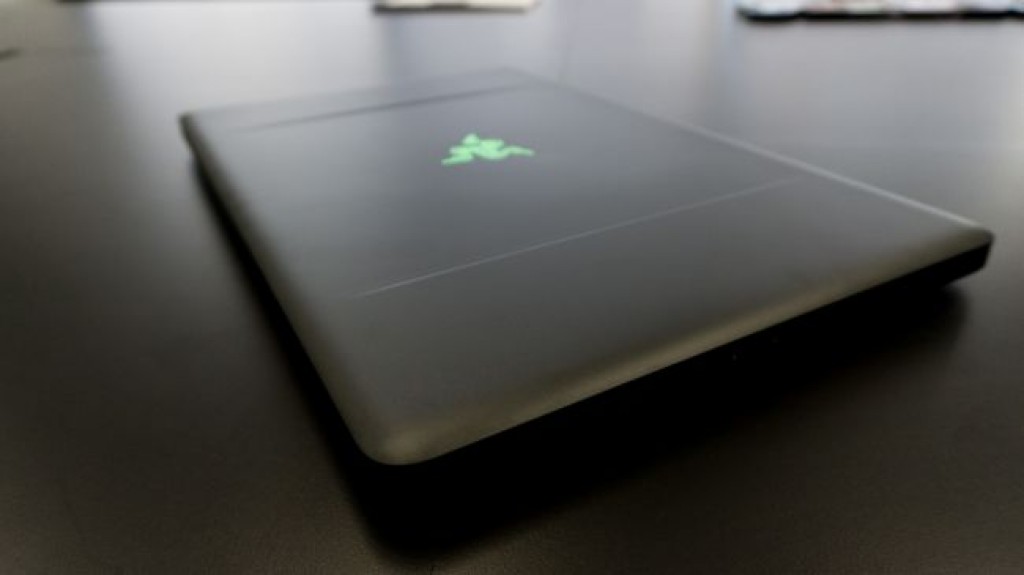
Design
But before we talk about what’s inside the 2016 Razer Blade Pro that makes it so great, let’s spend a minute analyzing the exterior.
If the all-black, unibody CNC chassis looks familiar, you’re not going crazy. It’s visually identical to the design you’ve seen on the Razer Blade, Razer Blade Stealth and even the 2015 Razer Blade Pro. It’s so similar to the latter, in fact, that it shares almost the same exact dimensions – 16.7 x 11 x 0.88 x inches (4.24 x 2.81 x 2.25cm; W x D x H).
It has an anodized finish fused to an aluminum chassis that’s cool to the touch and, for the first time ever, that stylish LED logo that can be customized via the company’s Chroma engine.
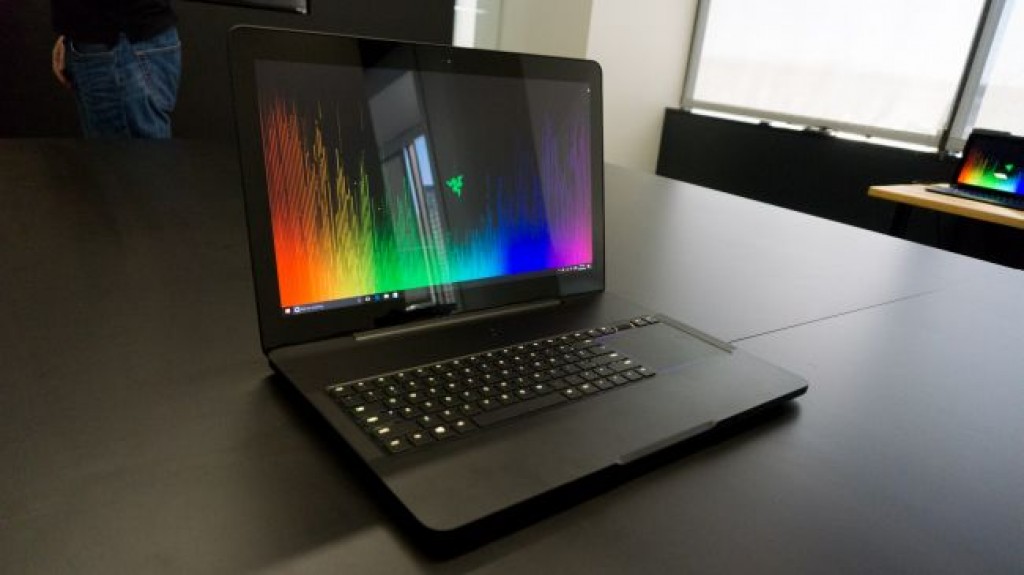
Crack the laptop open and you’ll find a gorgeous 17.3-inch IGZO UHD screen which, beside the 4K resolution, it supports multi-touch control and Nvidia’s frame rate-smoothing G-SYNC tech.
Below the touchscreen is a fully backlit, color-customizable LED keyboard featuring Razer’s Ultra-Low-Profile Mechanical switches, a first for any of Razer’s notebooks.
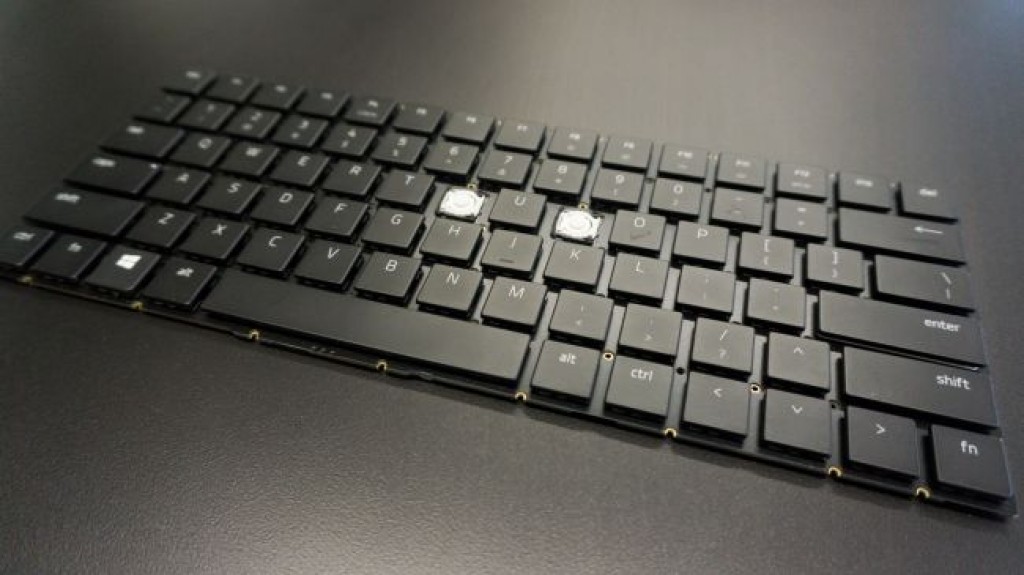
Keys sink with a satisfying click which, in addition to having a true actuation and reset point, help the keyboard feel more like the one you’d find attached to your gaming rig at home.
Additionally, keys can be customized through the Chroma app, allowing you to alter the LED lighting on an individual basis. And this personal lighting touch also extends to the massive touchpad to the right of the keyboard.
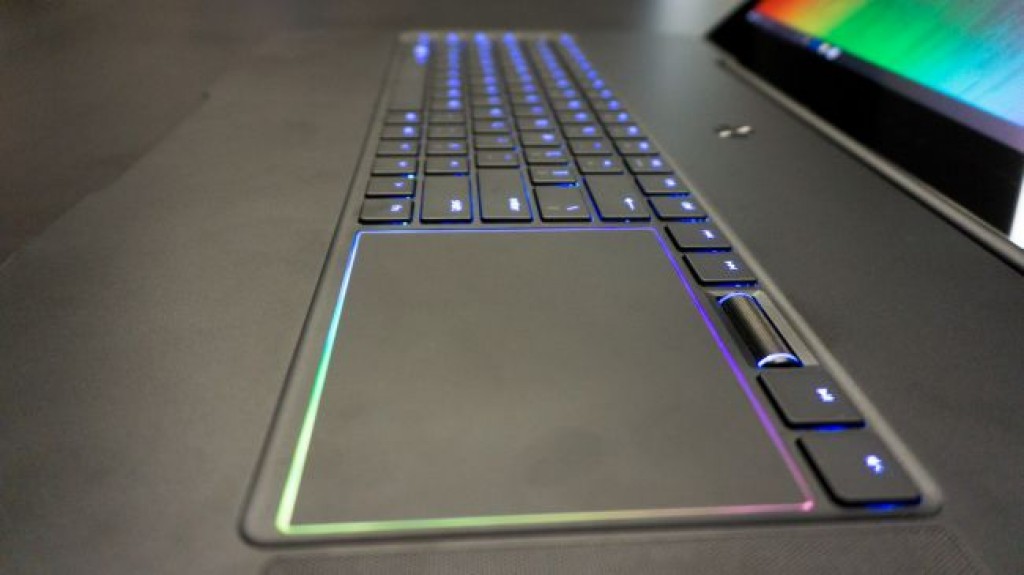
Weight-wise, the Pro tips the scales at 7.8 pounds (3.54kg). It’s a bit heftier than your standard ultrabook, but that’s because the Pro sports a 99WHr rechargeable lithium-ion polymer battery – the largest Razer can legally put into the laptop and still allow you to carry it onto an airplane.
Looking at inputs, the 2016 Razer Blade Pro rocks three SuperSpeed USB 3.0 ports, an HDMI 2.0 and the increasingly present Thunderbolt 3 port. New this year is an SD card slot, something which has long felt like a phantom limb on Razer’s laptop line.
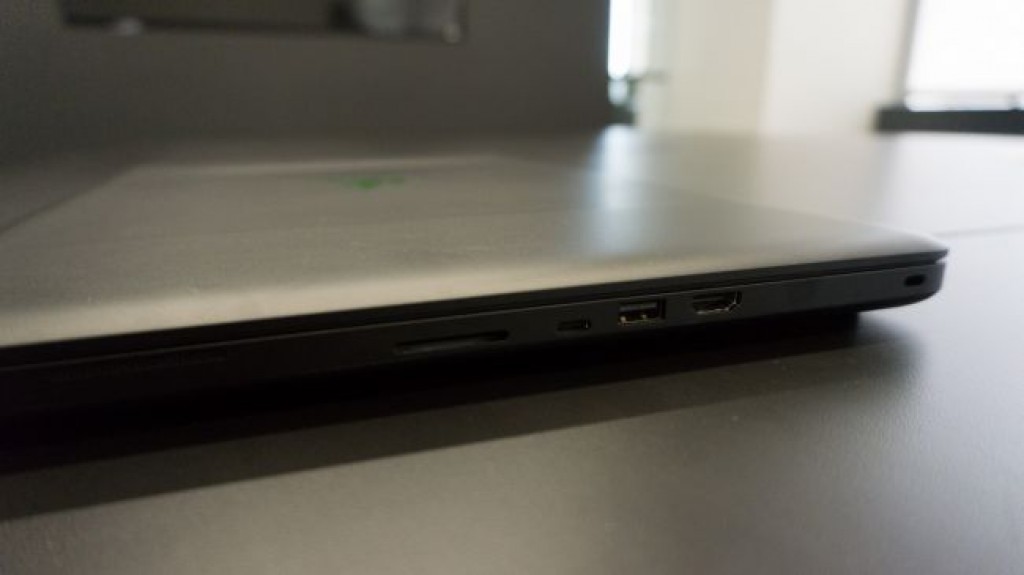
Strangely missing from the ports list is a connection for the company’s bespoke Razer Core external graphics encasement. When asked about the lack of the Razer Core connection, Director of Product Marketing, Systems at Razer, Kevin Sather, told me that it wasn’t impossible for the Razer Blade Pro to include the port later – but for now it wasn’t something that they’re focusing on.
Admittedly, the Razer Blade Pro’s specs are such that you likely wouldn’t need an external GPU anyway – c’mon, it comes stocked with a Nvidia GTX 1080 – however, the lack of the connector does limit the laptop’s upgradeability down the road.
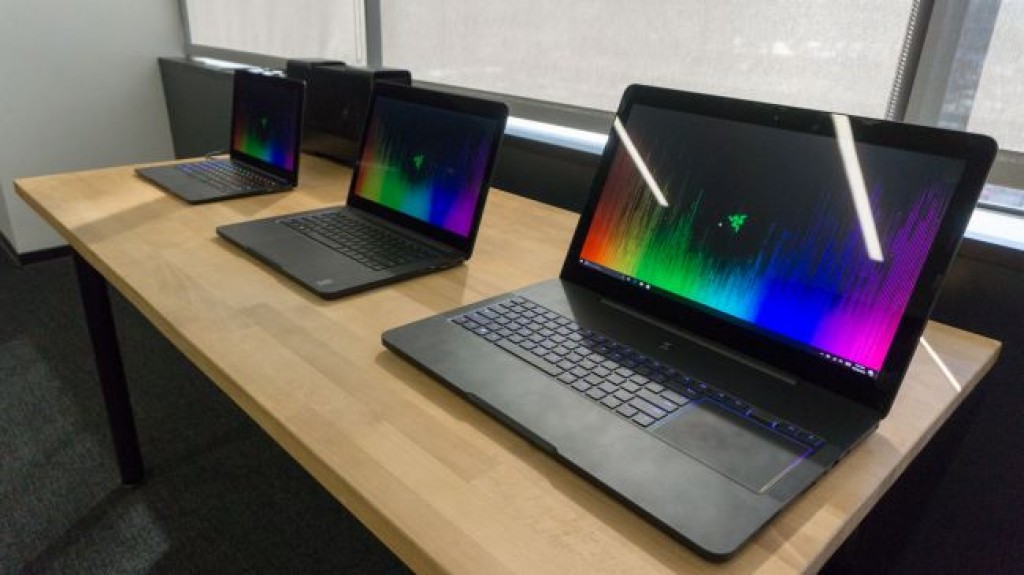
Specifications and features
OK, now we can talk about what’s going on inside the aluminum chassis.
To start off, the Razer Blade Pro is running off a 6th gen Intel Core i7-6700HQ quad-core processor that should absolutely tear through tasks like web-browsing with multiple tabs, image editing and video rendering.
On top of the CPU is a seriously powerful Nvidia GeForce GTX 1080 GPU with 8GBs of GDDR5X VRAM. That’s not only enough to run the vast majority of your favorite games on Ultra settings, but more than capable to power a VR headset like the Oculus Rift or HTC Vive.
In the memory department, the 17-incher supports a max of 32GB of DDR4 (2,133 MHz) memory. And if four times the recommended RAM isn’t enough, the included Killer Doubleshot Pro Wi-Fi antenna and ethernet port can prioritize bandwidth based on your current network speeds and running applications to get an extra edge in-game.
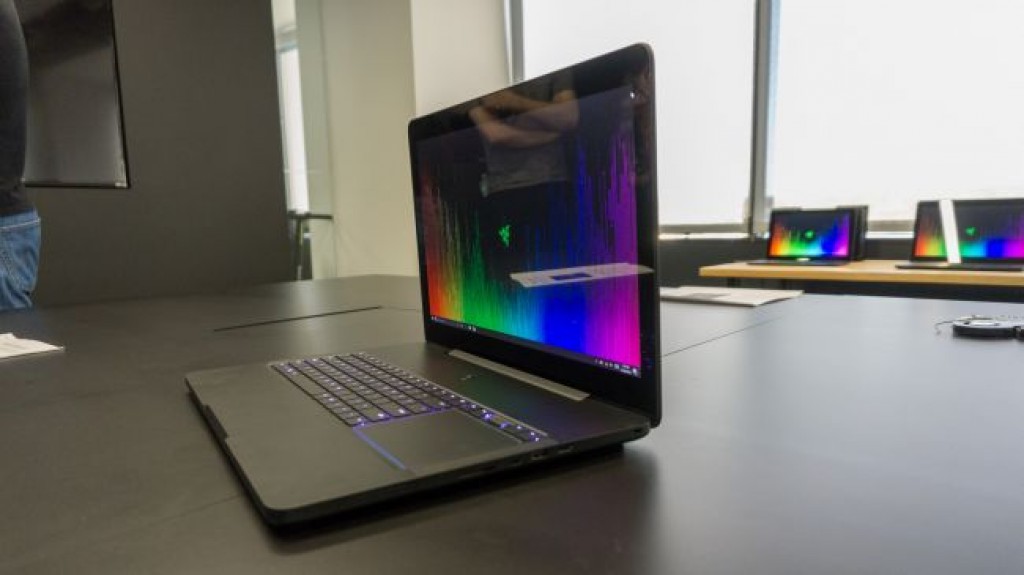
The base model of the Razer Blade Pro comes with a 512GB SSD in RAID 0 configuration (it’s two 256GB PCIe M.2 cards instead of one 512GB SSD), but that can be upgraded to either 1TB or 2TB depending on how much you’re willing to throw down on storage.
The configuration Razer presents here is a rock-solid one. It’s hard to find a glaring weakness in the parts other than their price tag which, admittedly, is pretty steep. Altogether the Razer Blade Pro is going to run you $3,699 or £3,499 (about AU$4,850).
There’s a bit of a discrepancy between what these parts cost on their own versus what they cost inside Razer’s machine, but that’s the price you pay for portability, I suppose.
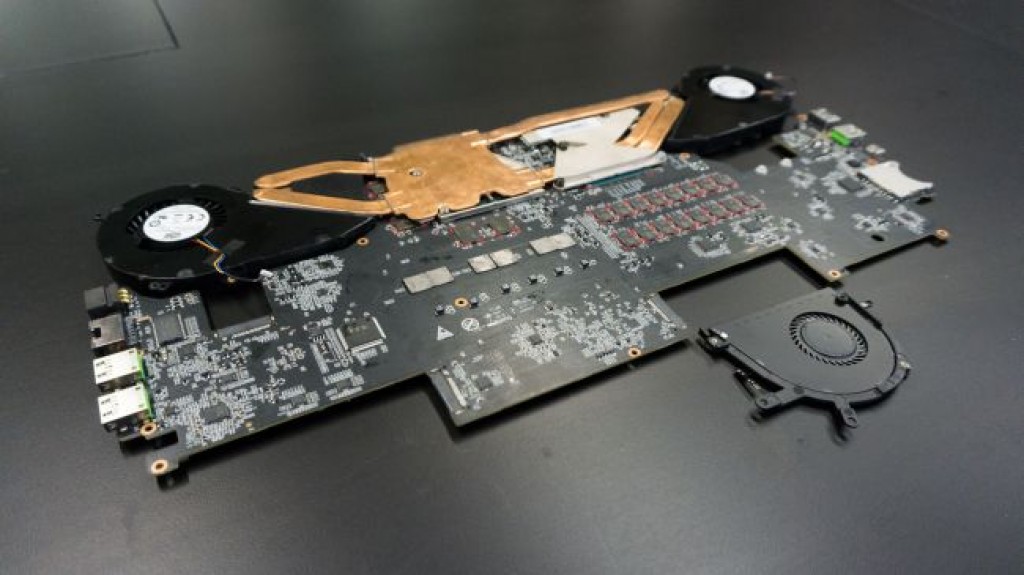
Heat problems? Don’t sweat it
One of the most unique aspects of Razer’s latest Pro laptop isn’t anything you can see on a spec sheet. Inside the chassis, Razer has designed a number of systems to keep things running cool, even when rendering games at maximum capacity.
The two key systems at work here are a vapor cooling system that pulls cold in from the side vents and pushes it through the vapor chamber before sending it out the front hinge, and a new internal fan that prevents small pockets of hot air forming inside the chassis.
The thinking behind the systems is that if you can prevent hot air pockets from forming, you’ll have fewer hot spots on the chassis and therefore make gaming a more comfortable experience on your lap and the desk.
It was neat to see the two systems pulled out of the system itself and explained in full detail by Razer’s Director of Product Marketing.

Early verdict
The Razer Blade Pro is definitely the gamer’s laptop. It’s spec’d that way. It’s designed to look that way. Heck, it even has a gamer-grade keyboard built right into it.
But, that being said, it’s not for the gamer on a budget – the ones scraping by to get through school or a recent college grad trying to make ends meet. At $3,699 or £3,499 (about AU$4,850), the newest Razer Blade Pro is pretty much for gaming’s top 1%.
It is, easily, one of the most svelte gaming laptops I’ve laid eyes on, and both inside and out it looks more than capable to take on the most graphically intense games of the next five years. It’s powerful enough to run VR systems, and its 4K touchscreen will make UHD games and content streamed from Netflix and Amazon Prime Instant Video look absolutely incredible.
Sourse: techradar.com








































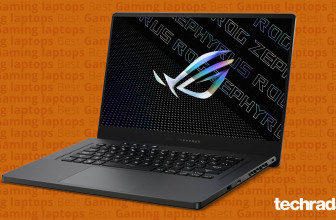
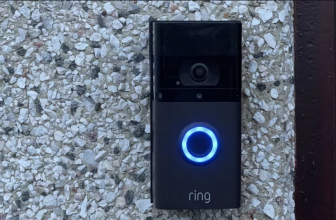
Screen isn’t 120hz refresh like the Alienware or MSI. For fps this is a deal breaker.
how? i currently have a GTX 1080 in my desktop…i have a 34″ 3440×1440 Ultra wide monitor…
literally no game that i play exceeds 100fps on full graphics and im not even running at 4k like the razer laptop has….i get around 70-90 FPS in most games.
i specifically didnt buy a 4k display because the 1080 simply isnt cut out for it, you’re going to get 60fps max with graphics at full.
Nick, have you had time to really get some gaming on with the Razer Blade Pro (2016)? I’m damn interested in picking one up to replace my aging 2011 MacBook Pro! Also, isn’t the Razer Core just hooked up via Thunderbolt?